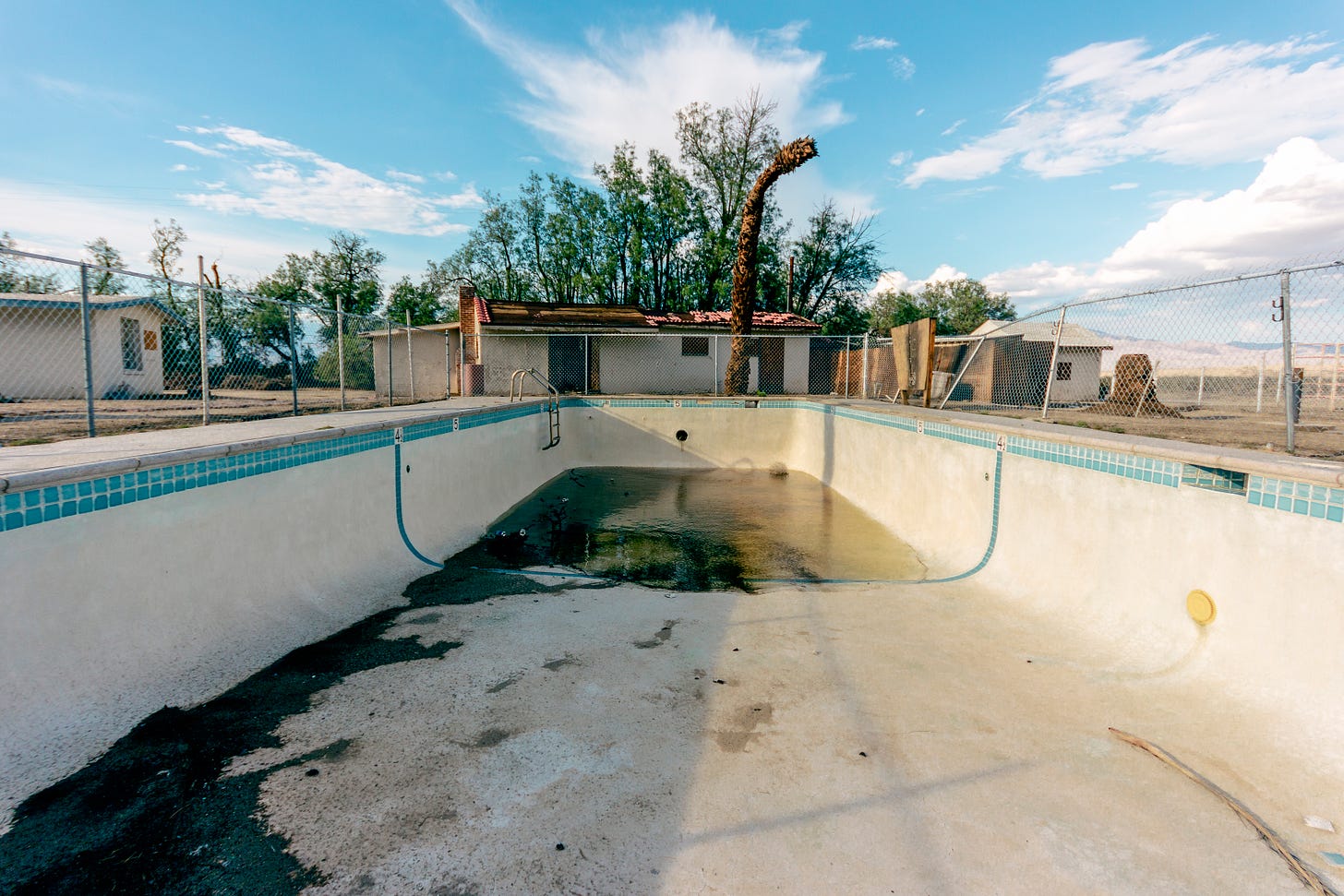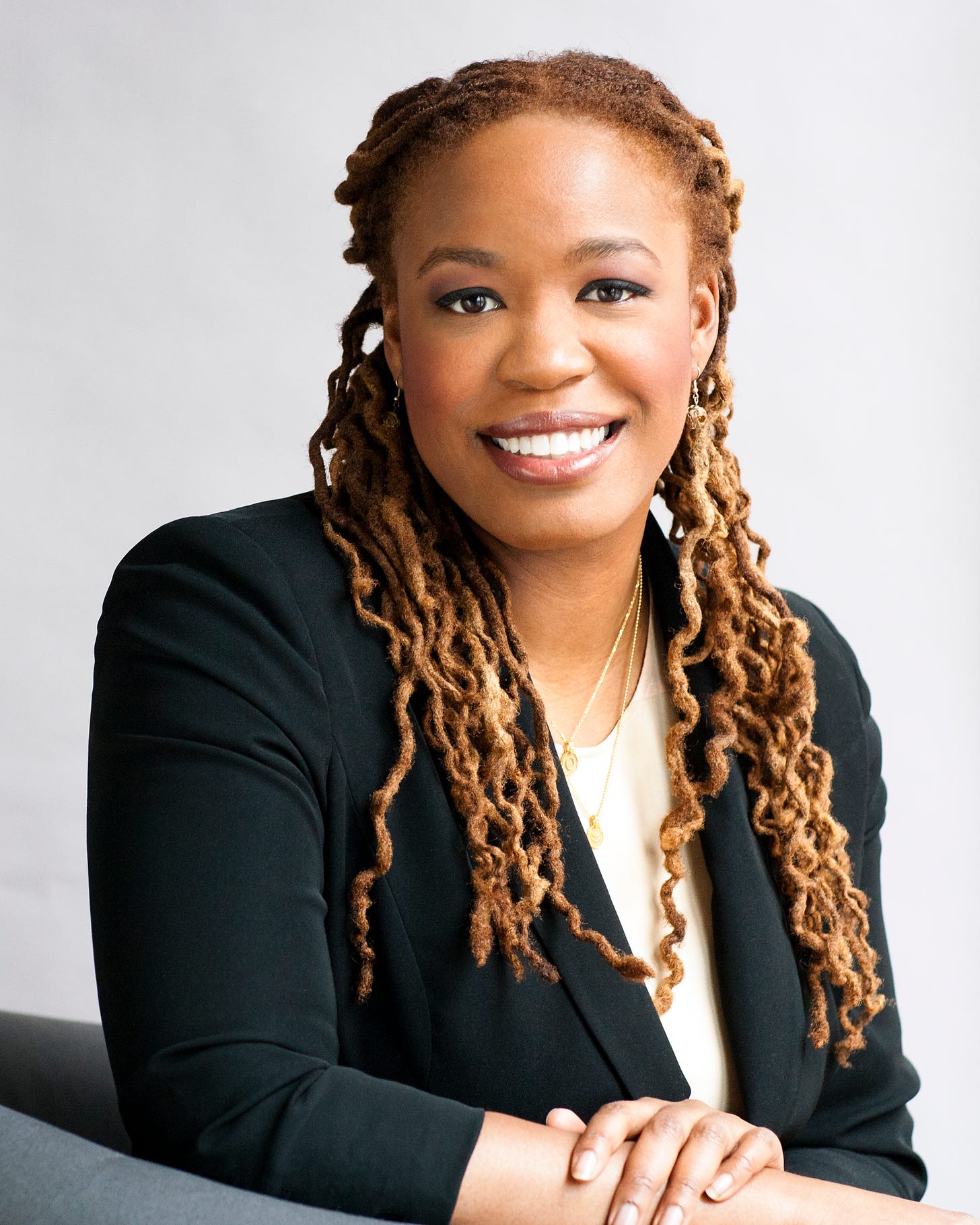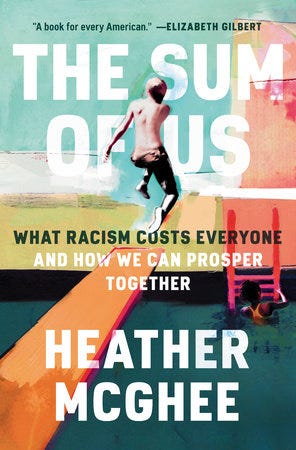Yesterday, in language both eloquent and plainspoken, Joe Biden summoned America into a new era. Whether people will come is another matter. He called for an end to the enmity and bitterness and mutual disgust that have defined this age of division. He invoked a hope of renewed common purpose in solving extraordinary problems.
Betraying his possible status as a closet Ink reader, he spoke of ending our “uncivil war.” (I still prefer “cold civil war,” but…)
But what will it take actually to end it? That is the subject of an interview I just did with Heather McGhee, a writer, policy guru, think tanker, and author of the new book “The Sum of Us: What Racism Costs Everyone and How We Can Prosper Together.”
Heather is a brilliant and original thinker who toggles easily between theory and practice, writing trenchantly about our national condition, drafting legislation, advising organizations, and then analyzing the whole shebang on television.
She has thought as hard as anyone about the problem President Biden now faces: how to unite the country, not by simply and emptily trying to unite it, but by fighting to make people’s lives better and convincing enough people that it is preferable to share the country with people who don’t look like you than to burn its institutions down.
“The Sum of Us” is going to be one of the more talked-about books of the year — mark my words. I’m thrilled that Heather’s first interview about it anywhere is with The Ink.
Which is a good chance to remind you that subscribing to The Ink is the best way to keep this newsletter free and open to all, and to support an independent publication that hopefully makes you think and enlivens your conversations. (And, if this new report is to be believed, is influencing the conversation in Washington.) I appreciate your support.
“To save this country from itself”: a conversation with Heather McGhee
ANAND: Your new book, “The Sum of Us,” argues that racism costs everyone, not just people of color. Can you recount the parable of the pool that anchors your argument?
HEATHER: The parable is a story that I grew up learning from family members. It was a very visceral memory for many of them. There was a grand, resort-style public swimming pool in the heart of their community. In fact, in the United States there were more than 2,000 of them that were built with tax dollars over the '20s, '30s, and '40s. In many ways, it was one of the most real, everyday examples of the New Deal consensus of government being a force for the improvement of the everyday quality of life of its citizens.
Yet in so many of these communities, the pools were for whites only or were segregated. In the 1950s and '60s, as the courts began to knock down these segregation codes in recreational facilities, many towns in virtually every region of the country decided to drain their public swimming pools, rather than integrate them. This happened in St. Louis. It happened in West Virginia, in Ohio, in Florida, and Louisiana.
When racism drained the public pool, everyone in the town — including white families — lost out.
It's the parable at the heart of “The Sum of Us,” because in many ways the era that I've known my whole life, the inequality era, has been defined most dramatically by the hollowing out of the public goods that we share in common, an era of austerity and a lack of investment in public infrastructure. Both the crumbling public infrastructure that we have, whether it's dams that are breaching and bridges that are collapsing and pipes that are leaching, or the kind of social infrastructure that we desperately need that we haven't even invested in like truly universal health care and child care.
The opening sentence of my book asks, “Why can’t we have nice things?” And the answer is that racism has drained our pools.
ANAND: Do you think a lot of white Americans are saying, "I would rather not go to college than to share college with these people"? Or do you think they're not realizing what they do?
HEATHER: There are a couple of things at stake. I traveled to Canton, Mississippi, outside of Jackson, to talk to white and Black car factory workers, a majority of whom had just voted against unionization with the United Auto Workers. I talked to workers who were very clear that racism was an overarching force in the white votes against the union and that it was a very racially divided vote.
I'm from the Midwest, so I know that, basically, the best job you could have as a working-class person is a unionized manufacturing job. And so when I went down there, I was expecting the workers to explain that white workers were shooting themselves in the foot by voting no to the union.
But after spending a couple of days there, and hearing that white workers tended to have the slightly better-paying jobs — the easier jobs, the less automated and back-breaking jobs — it seemed like actually maybe there was a material, tangible benefit to being white at the plant. It made me question the idea that solidarity with Black workers was actually in the white self-interest.
But then I had to remind myself that none of the workers at the plant, even the ones at the cushier end of the assembly line, had reliable health care, or the right to collectively bargain, or job security, or a real defined-benefit pension.
So in many ways, there are serious benefits to a system of racial hierarchy. As a white person in a racially hierarchical system, you get to be treated better than the vast majority of people of color. That means something. That can mean life or death.
But what we're missing is that there is a different level that we could all be at if we didn't have such vulnerability among the white majority to this racist divide-and-conquer strategy, which is ultimately wielded by plutocrats. Ultimately, the people who benefited from this zero-sum mindset that sees progress of people of color as coming at their expense are the people at the very top.
And in very concrete ways today, you look at who is aggressively selling that story to the white majority, it's billionaires and millionaires. Whether it's the Murdoch family, who literally created a plutocratic propaganda machine in order to revive that story in the white consciousness, or people like Donald Trump.
ANAND: As you know, I have been a skeptic of the idea of “win-win” when voiced by those plutocrats. And when I first heard about your book, I was curious about the political imperative of saying, "Racial progress is a win-win for everybody. White people, you'll be better off in the new world also." After all, isn’t it better to be on top of a society where you don't have to be the most capable applicant to get a job or where people call you Sir and Ma'am for no reason? Are we lying to white people by telling them that progress is a win-win?
HEATHER: No. For the most part, when we talk about white privilege, we're talking about privileges that every human being should have. The privilege not to be afraid of the police. The privilege to be able to rely on a little bit of wealth to fund your dreams and go three or four months without income. The privilege to be able to be treated well by decision makers. The privilege to have your vote reliably count.
Part of what American racial consciousness has done is to ratchet down white people’s expectations for themselves.
At the very bottom of the social hierarchy was Blackness, which was the embodiment of all that one did not want to be. So it was good enough to just not be Black. The functioning of a rapacious capitalist system requires a bottom to be so low that people are grateful to be a hair's breadth above that bottom.
ANAND: It reminds me of that old MADtv skit “Lowered Expectations.” You’re describing the function of racism as being not only to injure people of color but also to lower white people's expectations for themselves. To feel like they don’t deserve nice things besides the nice thing of being white.
HEATHER: That's exactly right. I've been a public-policy advocate for nearly 20 years, and I've lived that entire time trimming the sails of our policy ambition because of the fear of what the white moderate will accept. When I was digging into the social science data, I found that, in 1960, nearly two out of three white Americans thought the government ought to guarantee a job to anyone who wants one and ought to ensure a minimum standard of living for everyone in the country.
I could barely believe it. Who were these mythical white people who wanted such an activist role for government? The support for such ideas got cut nearly in half by 1964, when the beneficiaries of those kinds of government benefits would have been extended across the color line.
This has always been the tension of social democracy. This is why race-baiting and red-baiting have always been so intertwined. The idea of equality in the context of a multiracial America is a fundamental threat to white feelings of self-worth, belonging, and status.
ANAND: A lot of liberals listening to you would say these folks you're describing are voting against their self-interest. But that has always rung hollow to me, because racism is very much an interest, is it not?
HEATHER: They vote in their perceived racial interest, and against their class interest. I don't understand how you can be a student of American history or be alive in today's politics and not understand how powerful that racial interest is. Even if it only affords you the ability to be able to march into the Capitol and walk back out and have daiquiris, it's clear that there are material and social benefits to whiteness in a vastly unjust society.
But in the nation with the largest economy on Earth, and potentially the largest representative multiracial democracy on the planet, we could have, for all of us, a much higher standard of living and much more economic security.
ANAND: Right now you don't just have a country divided writ large. People have these divisions in their family, in their neighborhoods. We are exhorted by our leaders to try to talk to each other again, but no one wants to have that conversation right now or knows how. In that connection, I wanted you to tell us the story of you and Garry.
HEATHER: It was August of 2016, during the Trump-Clinton campaign summer. I was on C-SPAN's “Washington Journal” to talk about public policy issues. Halfway through the program, a man called in identifying himself as Garry from North Carolina.
His first words were, "I am a white male. I am prejudiced." He then went on to detail his prejudice against Black men and drugs and crime. But then he said something that I'll never forget. He said, “What can I do to change, to be a better American?”
ANAND: Wow.
HEATHER: There was something about the way this faltering man was still able to articulate a gut-level understanding that to overcome that prejudice would make him a better American, and that we, as Americans, need to reject the racial story that has been sold to us day in and day out.
That story was being sold to him particularly — a white, working-class, middle-aged man who lives alone in the exurbs in North Carolina, whose most constant companions are his dog and Fox News. He was being aggressively marketed an idea that he should fear Black people. As he would later say, in one of many conversations that since we've had over the years, that fear and that anxiety were killing him.
ANAND: Killing him how?
HEATHER: Killing him in the sense that he felt a weight on his chest. He really believed that a large chunk of the population are mendacious criminals and that another large chunk of the population are machete-wielding home invaders. And the borders are open to even more dangerous people, and the liberals are coming for your security, your home, your wife, your children, your guns. It is a terrible way to live.
ANAND: Your body is on perpetual war footing.
HEATHER: Fear and anxiety were showing up in his blood pressure and made him uncomfortable walking through the world.
I ended up responding to him just off the top of my head, thanking him for admitting his prejudice and giving him some ideas about how he could integrate his life. That conversation went viral. We ended up meeting in North Carolina a few weeks later in person.
I've learned a lot from Garry over the years. It's been an up-close-and-personal lesson in how the Trump message and how the right-wing media system exploit our vulnerabilities and isolation, exploit identities like being a veteran, exploit identities like being a Christian, to pump people full of these really fear-mongering, terrible ideas about what your fellow Americans are up to and the threats that they pose to you and yours.
ANAND: The Garry story is both inspiring and dispiriting to me, because it seems hard to imagine doing what you did at any kind of scale. We have millions of people who seemingly need to think through these issues and untether their own identity from racism. What do you think about the practical question of how we actually change how white people see themselves?
HEATHER: First, we have to turn off the spigot. Everything we believe comes from a story we've been told. And the zero-sum racial story is one of the oldest stories in the American playbook, and it is sold for profit by people who are benefiting from this current economic system. We just can't have our most-watched cable news, our most-circulated social media memes, our most-listened-to radio, and our most powerful megaphone in the White House all screaming that right-wing message 24/7 and not expect this kind of brainwashing.
They're very clear about their narrative in a way that the left is absolutely not. So I think we have to turn off the spigot.
ANAND: How? It feels hard to even think about how you'd do that.
HEATHER: We need media reform that has a new standard of fairness and accuracy. I also think that people who want to see a shift have to use this moment in the wake of the Capitol insurrection to get real accountability and consequences for the purveyors of disinformation.
If Democrats, the media, and corporate leaders don't see that kind of accountability as important to the long-term trajectory of this country's cohesion and the endurance of our democracy, they're absolutely missing a sense of history. They're fooling themselves about how dangerous this is.
ANAND: I want to ask you about Joe Biden. I wonder how you think he could speak to Americans, especially white Americans, about race, given his own mixed record and, in more recent years, his evolution on race.
HEATHER: He has to talk about his own journey of realizing that he was wrong and why. He has to talk about the widespread nostalgia for the Scranton-type middle class as something he shares, and yet disavow what so often comes along with it, which is the desire to blame immigrants and Black people and the cities for the loss of those jobs and the loss of that dream. And he needs to connect what happened to Scranton to the same class of people who are selling racist propaganda and profiting from white votes for the Republican Party.
He's got to give up on the idea that Trump is an aberration in the Republican Party. He's got to connect Trump's outright white supremacy to the tilling of the soil by a Republican Party that adopted a Southern strategy that was about economic redistribution upwards but used the emotional notes of white grievance.
He can, I believe, recast the story of American poverty as not a moral or cultural failing. He really in many ways can be an avatar of a white moderate journey.
ANAND: How do we make the case to millions of white people that they will truly be better off in the after picture you portray — the new, emerging America of racial equity, the nation of the world?
HEATHER: This book recounts my journey across the country, from Maine to California to Mississippi and back again, meeting with hundreds of people. And I saw people who have discovered what I began to call a solidarity dividend, not just the cost of racism to us all, but the benefit of coming together in collective action to do that which we cannot do alone, those benefits being higher wages, cleaner air, better public schools.
Those people who have linked arms with people across lines of race, in order to fight for something for themselves and their families, had a joy to them and a sense of purpose and a sense of ease with the way they walked through the world, because they had discovered our common humanity.
In Kansas City, I met with a white woman named Bridget who had gone to an organizing meeting for fast-food workers and originally thought, "Hell no. They're never going to pay someone like me $15 an hour." She'd not only believed the anti-immigrant idea that immigrants were criminals who were trying to take white people's jobs, but she also believed that her labor was never going to be worth much.
When she joined the community organization called Stand Up KC and became an activist alongside Black and brown workers, she not only began to just trust her fellow Americans more. She began to believe in a higher horizon for herself, and she was transformed.
That's what I see as possible. And that's what I see as necessary in order for us to save this country from itself.
Heather McGhee is a writer, policy expert, and political commentator. You can pre-order her new book, “The Sum of Us: What Racism Costs Everyone and How We Can Prosper Together,” now. This interview was edited and condensed for clarity.
Subscribing to The Ink is the best way to keep it free and open to all, and to support independent media that hopefully makes you think and enlivens your conversations. I appreciate your support for this undertaking.
Photo: Loop Images/Getty
This post was originally published on The.Ink.





